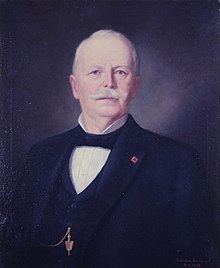Robert Lowry (governor)
| Robert Lowry | |
|---|---|
 |
|
| 32nd Governor of Mississippi | |
|
In office January 2, 1882 – January 13, 1890 |
|
| Lieutenant | G. D. Shands |
| Preceded by | John Marshall Stone |
| Succeeded by | John Marshall Stone |
| Personal details | |
| Born |
March 10, 1829 Chesterfield County, South Carolina, U.S. |
| Died | January 19, 1910 (aged 80) Jackson, Mississippi, U.S. |
| Political party | Democratic |
| Military service | |
| Allegiance |
|
| Service/branch |
|
| Years of service | 1861–65 |
| Rank |
|
| Commands |
6th Mississippi Infantry Regiment Lowry's Brigade |
| Battles/wars | American Civil War |
Robert Lowry (March 10, 1829 – January 19, 1910) was an American politician and a Confederate States Army general during the American Civil War.
Lowry was born in Chesterfield County, South Carolina in 1829 and was raised in Mississippi. During the American Civil War he enlisted as a Private in the Confederate States Army. He quickly received an officer's commission in the 6th Mississippi Infantry Regiment. He commanded the regiment at the Battle of Shiloh where it which suffered very heavy casualties and he was wounded himself. In early 1864 he led the troops that were sent to put down the local uprising of citizens near Jones County, Mississippi. Later Lowry commanded a brigade of Mississippi regiments in the Third Corps of the Army of Tennessee; an in February 1865 he was finally promoted to Brigadier General. When the war was over, he returned to the practice of law at Brandon. Lowry briefly served in the state senate after the war (1865–1866). Massive fraud in the gubernatorial election of 1881 resulted in the election of the subject over the Independent People's Party candidate, Benjamin King.
Between 1882 and 1890 he was the Democratic governor of Mississippi, serving two four-year terms. He could be called a Bourbon Democrat. The Farmers' Alliance movement continued to show local action in Yazoo County and in most areas of the state. Governor Lowry called out the state militia to keep the peace in Leflore County at the end of his term of office. Political activity related to peonage and racial discrimination in the Mississippi delta and other areas of the state led to violence during his term of office. Rapid industrial development occurred during his administration as well as the founding of the first state-supported women's college at Columbus.
...
Wikipedia
